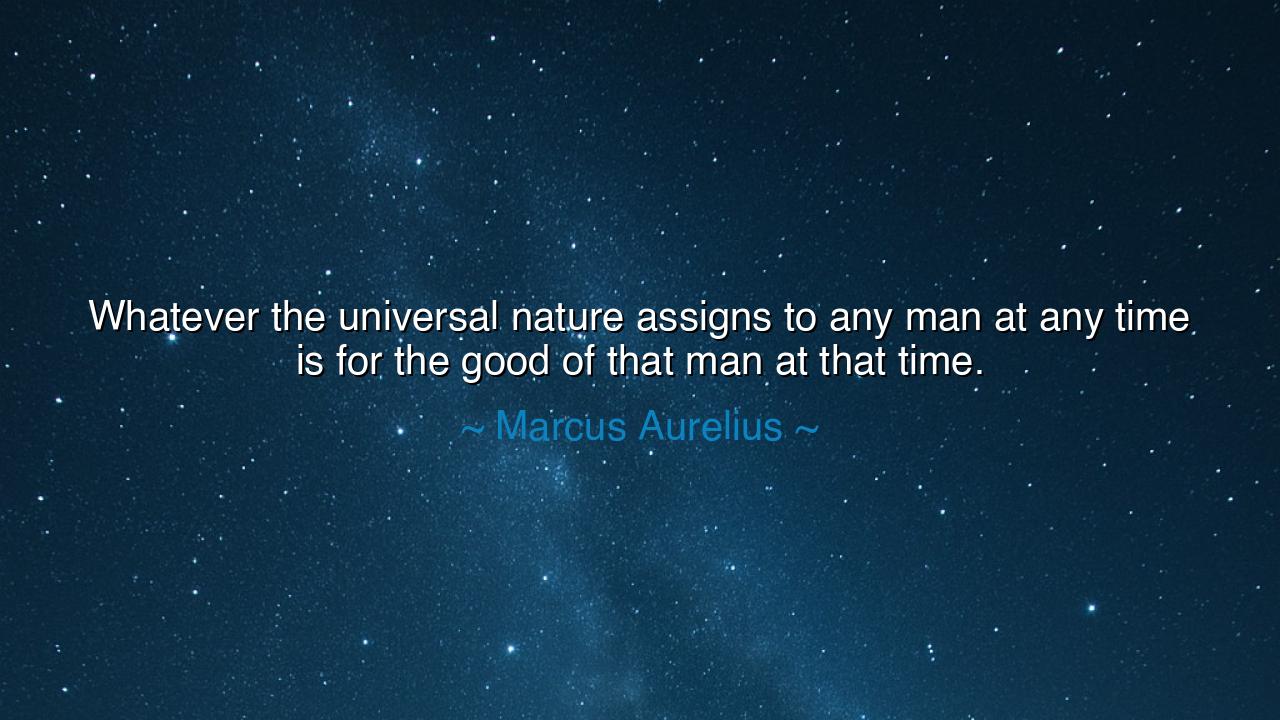
Whatever the universal nature assigns to any man at any time is
Whatever the universal nature assigns to any man at any time is for the good of that man at that time.






Marcus Aurelius, philosopher and emperor, spoke with the gravity of one who bore both the sword and the scroll: “Whatever the universal nature assigns to any man at any time is for the good of that man at that time.” These words, preserved in his Meditations, are no idle musings but the distilled essence of Stoic wisdom. They remind us that life is not chaos, nor are its trials meaningless. All that befalls us—victory or defeat, joy or sorrow—is appointed by a higher order, the universal nature, and is therefore to be received not with bitterness but with courage, trust, and resolve.
To understand this teaching, one must first understand what Marcus meant by universal nature. To the Stoics, the cosmos itself is a living order, governed by reason—the Logos. Nothing occurs outside of this order, and all things are woven together in a tapestry we cannot always see. What to us appears as misfortune may, in the broader design, be the very thing necessary for our growth. Thus Marcus, burdened with wars on the frontiers and betrayals within his court, still could say: this too is for my good, though it burns like fire. For in hardship lies the sharpening of virtue.
History offers us many mirrors of this truth. Consider Nelson Mandela, imprisoned for twenty-seven years. To most, such a fate would seem the ruin of a life. Yet Mandela himself later said that prison taught him patience, discipline, and forgiveness—that it prepared him to lead a nation. What seemed the greatest cruelty was transformed into the soil of greatness. So too Marcus Aurelius reminds us: what the universal nature assigns is not to destroy us, but to shape us into what we must become.
The imagery of this teaching is heroic. Imagine a soldier assigned to a post on a cold, lonely frontier. He may wish to be elsewhere—in warmth, in glory—but his commander has placed him there for a reason. The duty of the soldier is not to complain but to stand firm, to learn what the post demands, to fight where he is planted. So it is with life. Our assignment—be it illness, loss, obscurity, or labor—is given to us not by chance but by universal nature, and within it lies the opportunity for virtue.
Yet this teaching does not ask us to submit with passivity. To say that all is for our good is not to say we must love suffering, but to recognize that even suffering can be transformed into strength, wisdom, or compassion. Marcus himself endured plague, betrayal, and war. He did not deny the pain, but he refused to see it as meaningless. Instead, he chose to wrestle from it the lessons of endurance, humility, and justice. This is the heart of Stoicism: to accept what comes, and then to act nobly within it.
The lesson for us is profound: resist the temptation to call events “good” or “bad” in the moment. Instead, ask: How may this serve my growth? What virtue is being tested here? By shifting our vision, we cease to be victims of fate and become students of destiny. The hardships that seem to crush us may, in truth, be lifting us higher. The blessings that seem sweet may conceal hidden dangers if we grow complacent. All is part of the great design of universal nature, and all can be used for the shaping of the soul.
Practical actions follow from this wisdom. When adversity comes, pause and remind yourself: “This has been assigned to me; therefore, it is mine to face.” Do not run from your post. Instead, search for the virtue it calls forth—patience, courage, temperance, or love. When fortune smiles, do not grasp it greedily, but accept it as a temporary gift, a chance to practice gratitude and generosity. In this way, every moment—whether sweet or bitter—becomes fuel for the soul’s ascent.
Thus Marcus Aurelius, emperor and servant of wisdom, speaks across the centuries. His words remind us that nothing is wasted, nothing is random, nothing is without purpose. “Whatever the universal nature assigns to any man at any time is for the good of that man at that time.” Let us, then, accept our assignments with dignity, and by so doing, rise above despair into the calm strength of those who know that life, in all its turns, is always guiding us toward the eternal.






AAdministratorAdministrator
Welcome, honored guests. Please leave a comment, we will respond soon